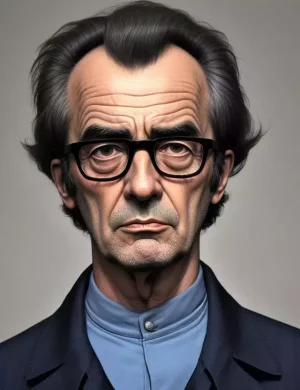Jean-Luc Godard
Early Life and Entry into Cinema
Jean-Luc Godard, born on December 3, 1930, in Paris, France, embarked on his cinematic journey with a passion for storytelling and a desire to challenge traditional filmmaking norms. His early experiences as a film critic and involvement in the French film magazine 'Cahiers du Cinéma' laid the groundwork for his groundbreaking contributions to cinema.
Pioneering the French New Wave
Godard played a pivotal role in the French New Wave, a cinematic movement known for its innovative techniques, unconventional narratives, and a departure from traditional filmmaking conventions. His directorial debut, 'Breathless' (1960), marked a turning point in cinema, capturing the spirit of a generation and challenging established norms.
Notable Filmography
- Breathless (1960): Godard's debut feature, 'Breathless,' is a landmark in film history, known for its jump cuts, improvised dialogue, and the charismatic performance of Jean-Paul Belmondo. The film remains a classic and a defining work of the French New Wave.
- Vivre Sa Vie (1962): In this film, Godard explores the life of a woman who chooses a path of self-discovery and independence. The fragmented narrative and innovative storytelling techniques showcase Godard's commitment to pushing the boundaries of cinematic expression.
- Contempt (1963): 'Contempt' reflects Godard's engagement with both classical and modernist elements. The film, starring Brigitte Bardot and Michel Piccoli, explores the complexities of relationships and the intersection of art and commerce.
- Weekend (1967): This satirical film is a scathing critique of consumerism and bourgeois society. Godard's use of long takes and surreal elements showcases his continued commitment to experimentation and social commentary.
Later Career and Legacy
While Godard's later career saw a shift in style and thematic concerns, his impact on world cinema remained profound. His films continued to challenge audiences and provoke thought, reflecting his ongoing dedication to pushing the boundaries of artistic expression.
Personal Life and Philosophical Influences
Jean-Luc Godard's personal life, including his relationships and philosophical influences, has often been a subject of interest. His intellectual engagement with Marxism, existentialism, and political ideologies is reflected in the themes explored in many of his films.
Continued Influence and Recognition
As a cinematic revolutionary, Jean-Luc Godard's influence extends far beyond his active years in filmmaking. His impact on directors, writers, and cinephiles is immeasurable, and he continues to be celebrated for his contributions to the art of cinema.
Legacy and Enduring Impact
Jean-Luc Godard's legacy is defined by his role as a cinematic pioneer, challenging the conventions of storytelling and visual expression. His enduring impact on the French New Wave and the broader cinematic landscape cements his status as a visionary filmmaker whose influence will continue to shape the future of cinema for generations to come.
